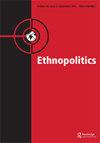Local Practices vs National Models of Integration? The Management of Ethno-religious Diversity in an Urban Context
IF 1.2
Q3 ETHNIC STUDIES
引用次数: 0
Abstract
AbstractThis article examines the ways in which ethnic and cultural diversity is concretely managed in the city of Marseille, a metropolitan area located in France, a country that academic literature defines as assimilationist. Based on a series of 26 semi-structured interviews and on the analysis of municipal archives, it reveals that ethnic, cultural and religious organizations are essential actors in local political life in Marseille. On one hand, in order to manage their culturally heterogeneous city, municipal officials rely on alliances with community leaders to maintain legitimacy among the local population. On the other hand, community leaders demand symbolic gestures of cultural recognition from the mayor in exchange for their political support. This paper, inspired by conceptual tools developed by Pierre Bourdieu, builds an innovative theoretical framework for analysis of the ‘social field of multiculturalism.’ In the process, it sheds light on strategies of negotiation and competition among different local actors in the daily management of diversity. Disclosure StatementNo potential conflict of interest was reported by the author(s).Notes1 Michèle Rubirola was elected mayor of Marseille on July 4, 2020. Benoît Payan (Socialist Party), succeeded Rubirola a few months later. Requests for interviews with the new municipal administration were made, but without success. It will be interesting to update the results of this research n the future, and to see how the relations between local politicians and community leaders will evolve after the election of Payan.2 The municipal council has general competence under common law to regulate through its deliberations the affairs of the municipality, under the terms of Article L. 2121-29 of the General Code of Local Authorities.3 Both coders used the same coding book, in order to achieve standardized coding and limit individual interpretations. The coding process, based on the grounded method theory (Corbin & Strauss, Citation2012), took place in three steps. A first step of ‘open coding’ consisted of identifying the various themes that emerged from the raw data. Our corpus was, therefore, read entirely, and the main themes identified were assigned to corresponding nodes. A second step of ‘axial coding’ consisted of clarifying the relationships between different nodes. Following the thematic analysis process developed by Van Dijk (Citation1993), the nodes were grouped around similar themes, which made it possible to form categories that corresponded to the results obtained. Third, an intercoder fidelity test was performed using Cohen's kappa coefficient. The result of 0.79 is considered ‘substantial’ (Landis & Koch, Citation1997). Finally, our research findings are presented according to the most salient elements that emerged from the coding of our sources. List of nodes (subnodes in parenthesis): Africa, antisemitism, career, City council, crime, community leaders, community recognition, contribution of the community to the city (from a cultural point of view / from an economic point of view), cultural richness of the city, diversity, islam (mosque / islamophobia / others), far right (National Front, Rassemblement National, far right in Europe, opposition to the far right), festivals / activities organized by the City Council (Vivacité / gala / meetings / ceremony), French Republicanism (model of integration / laïcité), history of migration to the city, poverty, peace and conviviality, perception of the city by the media, racism / discrimination, recognition of past prejudice (Armenian genocide / holocaust / slavery / ‘pieds noirs’ / harkis / others), soccer, terrorist attacks (Charlie Hebdo 2015 / Paris 2015 / 9/11).地方实践vs国家融合模式?城市背景下的民族宗教多样性管理
摘要本文考察了法国马赛市的种族和文化多样性的具体管理方式,马赛市是一个大都市区,学术文献将其定义为同化主义国家。基于一系列的26个半结构化访谈和对市政档案的分析,它揭示了种族、文化和宗教组织在马赛当地政治生活中的重要角色。一方面,为了管理这个文化多元的城市,市政官员依靠与社区领袖的联盟来维持当地居民的合法性。另一方面,社区领导人要求市长做出文化认可的象征性姿态,以换取他们的政治支持。本文受皮埃尔·布迪厄(Pierre Bourdieu)开发的概念工具的启发,为分析多元文化主义的社会领域构建了一个创新的理论框架。在这个过程中,它揭示了不同地方参与者在日常多样性管理中的谈判和竞争策略。披露声明作者未报告潜在的利益冲突。注1米歇尔·鲁比罗拉于2020年7月4日当选马赛市长。几个月后,贝诺··帕扬(社会党)接替了鲁比罗拉。我们要求采访新的市政当局,但没有成功。在未来更新这项研究的结果,看看当地政治家和社区领导人之间的关系在payan选举后将如何演变,这将是很有趣的。2根据《地方当局通用法典》第L. 2121-29条的规定,市政委员会在普通法下具有一般权限,可以通过其审议来规范市政事务。3两位编码人员使用同一编码书。以达到标准化编码和限制个人解释。基于扎根方法理论(Corbin & Strauss, Citation2012)的编码过程分三步进行。“开放编码”的第一步包括识别从原始数据中出现的各种主题。因此,我们的语料库被完整地读取,并且确定的主要主题被分配到相应的节点。“轴向编码”的第二步包括澄清不同节点之间的关系。根据Van Dijk (Citation1993)开发的主题分析过程,节点围绕类似的主题分组,这使得形成与获得的结果相对应的类别成为可能。第三,采用Cohen’s kappa系数进行编码间保真度检验。0.79的结果被认为是“实质性的”(Landis & Koch, Citation1997)。最后,我们的研究结果是根据我们的来源编码中出现的最突出的元素来呈现的。节点列表(括号中的子节点):非洲、反犹太主义、职业、市议会、犯罪、社区领袖、社区认可、社区对城市的贡献(从文化角度/从经济角度)、城市的文化丰富性、多样性、伊斯兰教(清真寺/伊斯兰恐惧症/其他)、极右翼(国民阵线、国民大会党、欧洲极右翼、反对极右翼)、市议会组织的节日/活动(集会/晚会/会议/仪式)、法国共和主义(融合模式/ laïcité),移民到城市的历史,贫穷,和平与欢乐,媒体对城市的看法,种族主义/歧视,对过去偏见的承认(亚美尼亚种族灭绝/大屠杀/奴隶制/ ' pids noirs ' / harkis /其他人),足球,恐怖袭击(Charlie Hebdo 2015 / Paris 2015 / 911)。
本文章由计算机程序翻译,如有差异,请以英文原文为准。
求助全文
约1分钟内获得全文
求助全文

 求助内容:
求助内容: 应助结果提醒方式:
应助结果提醒方式:


